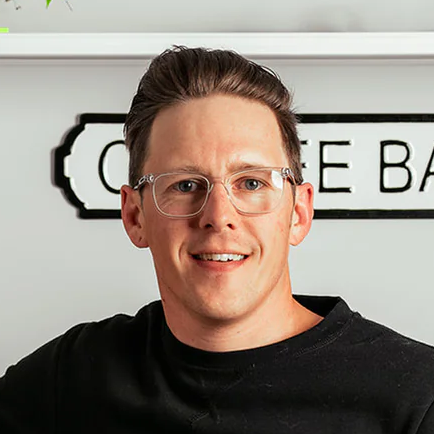
What Qualifies Someone as a Barista?
|
|
Time to read 2 min
Brew Better with Brewedco - Free shipping over $100 / $9.95 Express Shipping
Brew Better with Brewedco - Free shipping over $100 / $9.95 Express Shipping
Brew Better with Brewedco - Free shipping over $100 / $9.95 Express Shipping
Brew Better with Brewedco - Free shipping over $100 / $9.95 Express Shipping
Brew Better with Brewedco - Free shipping over $100 / $9.95 Express Shipping
Brew Better with Brewedco - Free shipping over $100 / $9.95 Express Shipping
Brew Better with Brewedco - Free shipping over $100 / $9.95 Express Shipping
Brew Better with Brewedco - Free shipping over $100 / $9.95 Express Shipping
Brew Better with Brewedco - Free shipping over $100 / $9.95 Express Shipping
Brew Better with Brewedco - Free shipping over $100 / $9.95 Express Shipping
Brew Better with Brewedco - Free shipping over $100 / $9.95 Express Shipping
Brew Better with Brewedco - Free shipping over $100 / $9.95 Express Shipping
Written by: Laurie Nance
|
Published on
|
Time to read 2 min
Ever wondered what really qualifies someone to call themselves a barista?
If you've spent time around cafés or coffee communities in Australia, you've probably heard the term thrown around. Barista might sound fancy, but what does it actually mean? Does making coffee at home qualify you? Or is there something more official involved?
After digging into this topic and talking with heaps of passionate coffee enthusiasts, here's what I've learned about what truly qualifies someone as a barista.
Being a barista isn't just about pulling espresso shots. It's about understanding coffee, knowing how different brewing methods affect taste, and consistently making great espresso-based drinks. I've found that baristas spend a significant amount of time perfecting their skills and learning about coffee beans, grinding techniques, and the subtle nuances that affect flavour.
Quality coffee beans make a difference, but it also comes down to skill. Precise measurements, grind consistency, and timing matter—a lot. If you're serious, investing in some reliable barista tools can dramatically speed up your learning curve.
What I've seen repeatedly is that mastering a few key skills truly defines a good barista. These skills aren’t always about complicated techniques but rather precision, practice, and passion.
Espresso extraction: Knowing exactly how fine your grind should be, tamping evenly (a good barista tool like a self-leveling tamper helps), and timing your shots to perfection.
Milk texturing: This skill is what separates average coffee from café-quality coffee. Frothing milk isn't hard, but it takes practice to get right consistently. Good milk pitchers help make that process smoother.
Latte art: Latte art isn't just for show—it demonstrates control over milk texture and pouring skills. Plus, customers always appreciate a beautiful coffee.
Coffee knowledge: Understanding flavour profiles, bean origins, and brewing methods makes a huge difference. This is where true baristas shine.
I found that in Australia, formal qualifications aren't always required, but they're definitely helpful. Courses like those offered by the Specialty Coffee Association or local Australian barista schools can quickly boost your credibility. Here's a great overview on barista careers if you're curious about professional training.
Still, practical experience matters most. A certificate doesn't automatically make someone a great barista. Experience behind an espresso machine, dealing with customers, and consistently producing great coffee under pressure is critical. In fact, most café owners prioritise experience over paper qualifications.
So, what skills are essential? Here’s what I've noticed sets the best baristas apart:
Attention to detail: Every little detail counts—from weighing beans to timing your espresso shots accurately.
Consistency: Delivering quality coffee consistently, even during busy periods, shows professionalism and dedication.
Customer service: Good baristas create positive experiences, not just great coffee.
Ability to multitask: Cafés can get hectic, especially in busy Australian cities like Melbourne or Sydney. Keeping calm under pressure is crucial.
Want more info? Check out this detailed guide on barista skills and training.
Absolutely! You don't need to work in a café to earn the title barista. Many passionate coffee enthusiasts in Australia proudly identify as home baristas. With the right barista kits, including quality scales, tampers, and distribution tools, you can craft café-quality coffee from your kitchen bench.
If you're already practicing espresso at home, mastering your setup, and consistently improving your skills, congratulations—you're well on your way. After all, barista skills come down to dedication, understanding coffee, and practice.
Need gear to kick-start your barista journey? We offer easy-to-use barista kits that simplify your setup.
[collection-carousel="barista-kits"]
Thinking about becoming a professional barista? Spend time practising, reading, and interacting with your local coffee community. Get involved in workshops or local barista training courses. Australian cities offer plenty of opportunities for passionate coffee lovers.
Here's another great resource I found helpful if you're considering formal training.
If you have questions or need personalised advice about barista skills or the tools you'll need, don’t hesitate to reach out to us. We're here to help you make the perfect brew every time.

I'm the founder of Brewedco Coffee™, passionate about coffee, coffee tools, and helping others better understand how to utilize them. With years of experience in the coffee industry, I love sharing insights on brewing techniques, choosing the right equipment, and the science behind making the perfect cup.
Thanks for subscribing!
This email has been registered!